Attorney General William Barr recently raised questions about whether major technology companies should remain largely immune from litigation regarding its user-generated content, adding that the technological landscape has changed much in recent decades.
Barr stated his concerns during a Feb. 19 Justice Department workshop on Section 230 of the Communications Decency Act. The act, which was passed in 1996, states that “no provider or user of an interactive computer service shall be treated as the publisher or speaker of any information provided by another information content provider.”





